WHEELS OF INDUSTRY.
Page 4
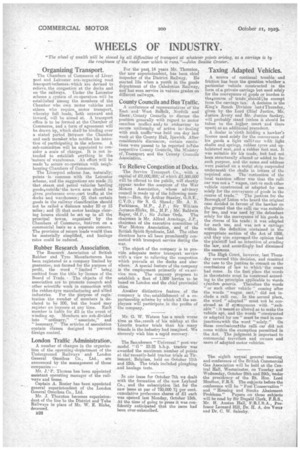
Page 5
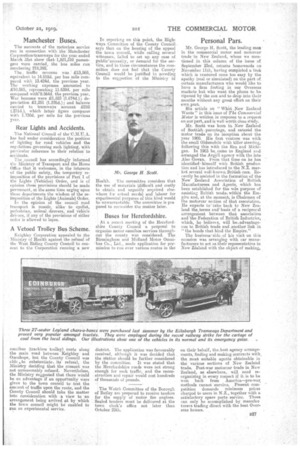
Page 6
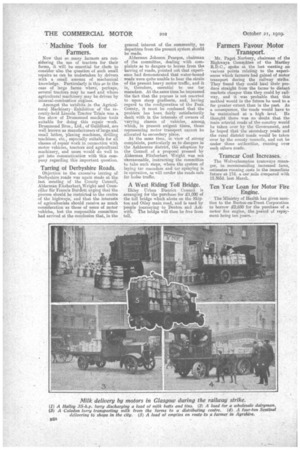
Page 7
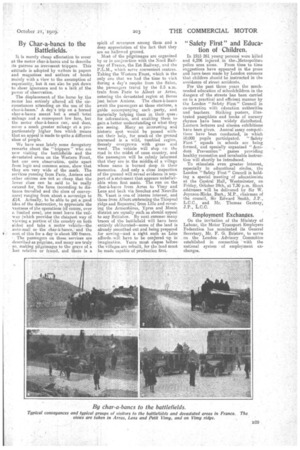
Page 8
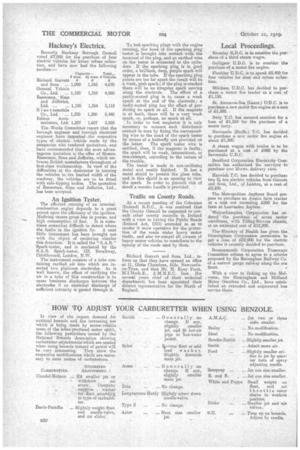
If you've noticed an error in this article please click here to report it so we can fix it.
The wheel of wealth will be slowed by all difficulties of transport at whatever points arising, as a carriage is by • the roughness of the roads over which it runs."—John Beattie Crosier.
Organizing Transport.
The Chambers of Commerce of Liverpool and Leicester are organizing road transport4schenies.which 'are devised to relieve, the congestion at the docks and
on the railways. Under the Leicester scheme a system of co-operation will be established among the members of the Chamber who own motor vehicles and others who require, motor transport, whereby full loads, Both outward and inward, will be aimed at. A transport office is to be formed at the Chamber of Commerce, and a form of agreement will be drawn -up, which shall be binding over a stated period lletween the Chamber and each member who notifies his intention of participating in the scheme. A sub-committee will be appointed to consider a scale of charges. It is not intended to establish anything in the 'nature of warehouses. An effort will be made 'to secure co-operation with neighbouring. Chambers of Commerce. The -Liverpool scheme has, naturally; points in common with the Leicester scheme, and the suggestions are made (1) that steam and petrol vehicles hauling goodasoutside'the town area should be given preference overscart, traffic at the docks and warehouses; (2) that certain goods in the railway classification should not be railed. a 'distance under 10 or 15 miles; and (3) that motor haulage clearing houses should be set up in all the principal towns, organized by the Chambers of Commerce, butirun on a commercial basis as a separate concern. The provision of return loads would then be materially simplified, and haulage rates could be reduced.
Rubber Research Association.
The ResearchAssociation of British Rubber and Tyre Manufacturers has been registered as a company limited by guarantee, not formed for the purpose of profit, the word "limited " being. omitted from the title by licence of the Board of Trade. The objects of the association are to promote research and other scientific work in connection with the rubber-tyre manufacturing and allied
industries. For the purpose of regis-• tration the number of members is dodared to be 200, but the board may register an increase at any time. Each member is liable for £5 in the event of, winding up. Members are sub-divided into " ordinary," " associate," and " honorary.'' The articles of association contain clauses designed to prevent foreign control.
London Traffic Administration.
A number of changes in the organization of the operating,departrnent of the Underground Railways and London General Omnibus Co., Ltd., are announced by the management of those companies :—
Mr. PP. Thomas has been appointed assistant operating manager of the railways and buses.
Captain A. Rozier has been appointed general superintendent of the London :General Omnibus Co., Ltd.
Mr. J. Thornton becomes superintendent of the line 'to the District and Tube Railways in place of Mr. W. E. Blake, deceased.
3326 For the past_ 14 years Mr. Thornton, the new superintenaent, has been chief inspector of the District Railway. He started life when a youth in the goods department of the Caledonian Railway, andlaS seen service in various grades on different railways..
County Councils and Bus Traffic.
A conference of representatives of the East andWest Suffolk, Norfolk and Easex.,County Councils to discuss the position generally. with regard to motor omnibus traffici and( to endeavour to secure uniformity of action in dealing with such traffivwaa held one day last week at the County Hall, Ipswich. After considerable discussion, certain resolutions were passedto be reported :bottle respective County Councils, the Ministry of. Transport and the County Councils Association.
To Relieve Congestion at Docks.
The Service Transport Co., with a capital of R2,000,000; of which £1,500,000 will be offered to the public, will shortly appear under the auspices of the War Motors Association, whose advisory council is made up of the following members :—Hon. Sir Arthur Stanley, G.B.E., C.V.O. ; Sir 8. G. Shead; Mr. A. B. Parkinson, M.P., ,LP.; Sir Wiliiam Joynson-Hicks, Bt., M.P. ; Mr: Baldwin Raper, .M.P..; Sir Julian Orde. The chairman is Mr. Alfred Armitage, J.P., chairman of the executive committee of War Motors Association, • and of the British Spirit Syndicate, Ltd. The other directors have all been prominently conneeted with transport service during the
war.
The object of the company is to provide adequate motor transport service with a view to relieving the congestion which prevails at the docks and elsewhere. A special feature of the company is the employment primarily of ex-service men. The company proposes. to establish a fleet of 1,000 lorries to be based on London and the chief provincial cities.
Another distinctive feature of the company is thet establishment of a copartnership scheme by which all the employees will participate in the profits of the company.
Mr. G. W. Watson has a much worse time as thejesult of his mishap at the Lincoln tractor trials than his many friends in theindustry had imagined. We sincerely wish him a rapid recovery.
The Saunderson " Universal " post-war model " G " 23-25 b.h.p. tractor was awarded the maximum number of points at the recently-held tractor trials at Tirlemont, Belgium, held on Ootober 11th and 12th. The trials included ploughing and haulage tests.
In our issue for October 7th we dealt with the formation of the new Leyland Co., and the subscription list for the new issue at par of 750,000 7i per cent. cumulative preference shares of .C.,1 each was opened last Monday, October 13th. At the time of going to press it was confidently anticipated that the issue had been over-subscribed.
Taxing Adapted Vehicles.
A source of continual trouble and friction has been the question whether a particular vehicle constructed in the form of a private carriage but used solely for the conveyance of'goods or burden in thescourse of trado'.:shOuld-;be exempt from the carriage tax. A decision in the King's Bench Division last tThursday, given by the Lord Chief Justice Mr. Justice Avory and Mr. Justice Sankey, will probably stand (unless it should be taken to the higher court and there
upset) as an additional precedent. •
A dealer in-cloth holding a hawker's licence used solely for the conveyance of his goods a light rani; car with light shafts and springs, rubber tyres and upholstered seat, ,and a rubber foot mat. It was suitable idr his trade, but had not been structurally altered or added to for such purpose, and the name and address were painted on a. metal strip suspended underneath the shafts in letters of the
required size. The 'contention of the local taxation officer was that the ralli car was not a "wagon, cart or such other vehicle constructed or adapted for use solely for the conveyance of goods in the course of trade." The justices for the Boroegli.of Luton who heard the original case decided in favour of the hawker on the ground that the ralli car was suitable for use and was used by the defendant solely for the conveyance of his goods in the cburse of his trade: it was adapted for such use, and was not a carriage within the definition contained in the appropriate section of the Act of 1888, and they also expres,sed:the opinion that the plaintiff had no intention of.evading the law, and accordingly had dismissed the summons.
The High Court, •however, last Thursday reversed this decision, and remitted the ease to the justices to commit on the conclusions of law to which' the court had come. In the first place the words in the :statute must be construed according to the principles applicable to words elusdem generic. Therefore the words "or such other vehicle " coming after the words "wagon. cart," did not include a ralli car. In the second place, the word "adapted" must not be construed as if syrasnymous with "suitable"; it meant so altered as to make the vehicle apt, and the words "constructed or adapted for use" must be read hi conjunctions with the word "solely." On these conclusions,the rani car did not come within the exemption permitted in the Act. The judgment is important to commercial travellers and owners and users of adapted motor vehicles.
The eighth annual general meeting and conference of Che British Commercial Gas Association will be held at the Central Hall, Westminster, on Tuesday and Wednesday, October 28th and 29th, under the presidency of the Rt. Hon. Lord Moulton, F.R.S. The subjects before the conference will be "Fuel Conservation" and "Housing and Smoke Abatement Problems." Papers on these subjects will be read by Sir Dugald Clerk, F.R.S., Mr. H. Austen Hall, F.R.I.B.A., Professor Leonard Hill, Dr. H. A. des Veeux and Dr. C. W. Saleeby.
Manchester Buses.
The accounts of the motorbus service run in connection with the Manchester Corporationitramways for the year ended March 31st show that 1,821,310 passengers were carried, the bus miles run numbering 216,292.
The traffic revenue was 213,569, equivalent to 14.918d. per bus mile cornpared with 13A24d. the previous year. The working expenses amounted to 210,585, representing 11.639d.• per mile compared with'9.564d. the previous year. War bonuses were 21,523 (1.67403 de. preriation 21,251 (1.376d.); and balance carried to tramways account 2210 (.231c1.), which latter figure compares with 1,730d. per mile for the previous year.
Rear Lights and Accidents.
The National Council of the C.M.U.A.. has had under consideration the position of lighting for road vehicles and the regulations governing such lighting, with particular reference to their relation to accidents.
The „council has accordingly informed the Ministry of Transport and the Home Office that it welcomes, in the interests of the public safety, the temporary reimposition of the provisions of Part 1 of the Lights (Vehicles) Order, and is of opinion these provisions should be made permanent, at the same time urging upon these departments the wisdom of The reimposition of the Lights (Animals) Order.
In the opinion of the council road transport is unsafe, alike to cyclist, pedestrian, animal drovers, and vehicle drivers, if any of the provisions of either order is allowed to lapse.
A Vetoed Trolley Bus Scheme.
Keighley Corporation appealed to the Ministry of Health against the refusal of the West Riding County Council to consent to the Corporation running a new
omnibus (trackless trolley) route along the main road between Keighley and Oxenhope, but the County Council was nble ,,,to substantiate, its refusal, the . Ministry deciding that the consent was not unreasonably refused. Nevertheless, the Ministry suggested that there'w6uld be an advantage if an opportunity were given to the town council to test the . amount of traffic upon the route, and the County Council should take the matter into consideration with a view to -an arrangement being arrived at by which the town council might be enabled to run an experimental service.
In reporting on this point, the High., ways Committee of the County Council. says that on the hearing of the appeal the town council, while calling several " witnesses, failed to set up any case of public'necessity, or demand for the service, and in these circumstances the committee does not feel that the County Council would he justified in 'acceding to the suggestion of the Ministry bf Health, The committee considers that the use of materials (difficult and costly to obtain and urgently required ekewhere for actual needs) and labour for experimental purposes of this, kind would be unwarrantable. The committee is pre pared to reconsider the matter later.
Buses for Herefordshire.
At a recent meeting of the Herefordshire County Council a proposal to organize motor omnibus services throughout the county was considered. The Birmingham and Midland Motor Omni'bus Co., Ltd., made application for permission to run over various routes in the
district. The application was favourably received, although it was decided that . the nititter should be further considered by the committee. • It was stated that the Herefordshire roads were not stroiag enough for such traffic, and the reconstruction and repair would cost hundreds of thousands of pounds.
• -• • The Watch Committee of the Borough of Batley are prepared to receive tenders for the supply of motar fire engines. Sealed tenders must be delivered at the town clerk's office not later than October 25th.
Personal Pars.
Mr. George H. Scott, the leading. man' in the commercial -motor and motorcar trade in New Zealand, whom we mentioned in this column of the issue of September 23rd, returns homewards on Noveriaber 11th, having completed ,a'task which is rendered none too easy by the apathy (real or simulated) on the part of certain manufacturers who would like to have a firm footing in our Overseas markets but who want the plums to be ripened by the sun and to drop into their mouths without any great effort on their own. part.
His article on " What New Zealand Wants" in this issue of Tile Commercial Motor is written in response to a request on our part, and is well worth close study.
Mr. Scott was born in, New Zealand of Scottish. parentage, and, entered the motor trade on its inception about the year 1900. His fast venture was with the small Oldsmobile with tiller Steering, following this with the Rea. and Michigan. In 190,3 he came to England and arranged the Argyll agency with the late Alec Govan. From that time on lie has identified, himself with British production and has introduced to the N.Z. market several well-known. British cars. Recently he assisted in the formation of the New Zealand Association of British Mamifacturem and Agents, which has been established for the sole purpose of assisting British trade: within the Empire and, at the moment, is Chairman of the motorcar section of that association. He expects to take back to New Zealand the.terms and' basis of a reciprocal arrangement between that association and 'the -Federation of British Industries, which, he believes, will be.,advantageous to British trade and ,another link in " the bonds that bind the Empire.".
The business' sideiof his visit on this occasion was arranging with car manufacturers to act as.their representative in New Zealand with the object of making, on their behalf, the,best agency arrangements, finding and making contracts with the most suitable agents ektainable in the various sections of New Zealand trade Post-war motorcar trade in New Zealand, as elsewhere, will need reorganizing in every respect if it is to be won back from America—pre-war, methods cannot survive. Present competition demands minimum prices charged to users in N.Z., together with a satisfactory spare parts. service. These can only be accomplished by mannfac turers trading direct with the best Overseas houses.
Machine Tools for Farmers.
Now that so many farmers are considering the use of tractors for their farms, it will be essential for them to consider also the question of such small repairs as can be undertaken by drivers with a small amount of mechanical knowledge. Particularly is this so in the case of large farms where, perhaps, several tractors may be used and where agricultural machinery may be driven by internal-combustion engines.
Amongst the exhibits in the Agricultural Machinery Exhibition of the recently-held Lincoln Tractor Trials was a fine show of Drummond machine tools suitable for doing this repair -work. Drumniond Bros., Ltd., of Guildford, are well known as manufacturers of large and small lathes, planing machines, drilling machines, etc., especially suitable for all classes of repair work in connection with motor vehicles, tractors and agricultural machinery, and users would do well to get into communication with this company regarding this important question.
Tarring of Derbyshire Roads.
Objection to. the excessive tarring of Derbyshire roads was again made at the last meeting of the County Council, Alderman Fitzherbert, Wright and Councillor Sir Francis Burdett urging that the process should be restricted to the centre of the highways, and that the interests of agriculturists should receive as much consideration as those of users of motor vehicles., but the responsible committee had arrayed at the conclusion that, in the
general interest of the community, no departure from the present system should be made.
Alderman JohnsonPearaon, chairman of the committee, dealing with complaints as to dangers to horses from the tarring of roads, pointed out that ,experience had demonstrated that water-bound roads were quite unable to bear the strain of the present heavy moter traffic, and it is therefore, essential to use tar macadam, At the same time he impressed the fact that the process is not resorted to upon steep gradients, and, having regard to the configuration of the Peak County, it must be confessed that the problem has been, fairly satisfactorily dealt with in. the interests of owners of varying classes of vehicles, among, which, in present exigent times, those. representing motor transport cannot be allocated to secondary place.
At the same time, in view of strong complaints, particularly as to dangers in the Ashlaourne district, the adoption by the Council of a proposal pressed by Alderman Fitzherbert Wright was not utheasonable, instructing the committee to take such steps, where the system of laying tar macadam and tar spraying is in 'operation, as will render the roads safe for horse traffic.
A West Riding Toll Bridge.
Ilkley Urban District Council is arranging for the purchase for 21,000 of the toll bridge which abuts on the Skipton and Otley main road, and is used by people journeying to Denton and Askwith. The bridge will then be free from toll.
Farmers Favour Motor Transport. '
Mr. Paget Norbury, chairman of the Highways Committee of the Martley R.D.C., spoke at the last meeting on various points relating to the experiences which farmers had gained of motor transport during the railway Strike. They found they could haul their produce straight from the farms to distant markets cheaper than they could by railway, and it was probable that this method would in the future be used to a far greater extent than in the past. As a consequence, the roads would have to be maintained at a high level. He thought there was no doubt that the main arterial roads of the country would be taken over by the Government, and he hoped that the secondary roads and the rural district roads would be taken over by the county councils, and not be wider three authorities, running over each others roads.
Tramcar Cost Increases.
The Wolverhampton tramways manager, in recommending increased fares, estimates running costs in the inarnediate future at 17.d a car mile compared with 12,365d. last March.
Ten Year Loan for Motor -Fire Engine.
The Ministry of Health has given sanction to the Burton-on-Trent Corporation to borrow £2,650 for the purchase of a motor fire engine, the.period of repSyment being ten years,.
By Char-a-bancs to the Battlefields.
It is merely eheaP affectation to sneer at the motor char-Asbancs and to describe its patrons as irrevewent trippers. This attitude is adopted by writers in papers and. magazines_ and authors of books mainly with a view to the assumption of superiority, but it can also be put down to sheer ignorance and to a lack of the power of observation.
The displacement of the horse by the motor has entirely altered all the circumstances attending on the use of the char-it-hancs.' A day, trip on a horsed char-a-banes meant but a small total . mileage and .a consequent low fare, but the motor char-I-bancs can, and does, cover a. much greater mileage at a proportionately higher fare which means that an appeal is made to quite a different
• class of people.
• We have seen lately some derogatory remarks about the "trippers " who are now visiting the battlefields and the devastated areas on the Western Front, but our awn observation, quite apart from logic and common sense, show that they are very wide of the mark. The services running from Paris, Amiens and other cgntres are not so cheap that the lower class can be said to be really catered for, the fares iaccording to distance travelled and the class of conveysince) ranging from about a sovereign to .814. Actually, to be able to get a good idea of the destruction, to appreciate the vastness of the operations (of course, over a limited area), one must leave the railway (which provides the cheapest way of
• viewing a portion of -the country an both sides) and take , a motor vehicle—the .auto-mail or -the char-aLbancs.,' and the cost of this for a. 'day is about 100 francs. The passengers on these 'services are described as pilgrims, and many are truly so, making pilgrimages to the grays of a lost relative or friend, and there is a spirit of reverence among them and a deep appreciation ofthe fact that they
are on hallowed ground.
Most of the pilgrimages are organized by or in conjunction with the Nord Railway of France, the Est Railway, and the P.L.1).4., which serve convenient centres. Taking the Western Front, which is the only one that. we had the time to visit during a day's respite from the Salon, the passengers travel by the 8.5 a.m. train from Paris to Albert or Arras, entering the devastated region at Bores just below Amiens. The chars-a-banes await the passengers at those stations, a guide accompanying each party, and materially helping them in their ques fOr information, and enabling them to gain a better understanding a what they are Seeing_ Many an interesting and historic spat would be passed without their help, for much of the ground traversed is a, wild, tumbled region, densely overgrown with, grass and weed. The vehicle will stop on the road in the midst of open country, and the passengers will be calmly informed that they are in the middle of a village whose name is burned deep in their memories. And only a close inspection of the ground will reveal evidence iustipport of a statement that appears unbelievable when first made. The run on the char-a-banes from Arras to Vimy and Lens and back via Sanchez and Neuville St. Vaast is one of intense interest, and those from Albert embracing the Thiepval ridge and Bapainne; from Lille and covering the Armentieres, Ypres and Menin district are equally such as should appeal to any Britisher. By next summer Many traces of the battlefield will have been entirely obliterated—same of the land is already smoothed out and being prepared for sowing—and a sight such -as -Lens affords, will have to be conjured up in. imagination. Years must elapse before" the, villages are rebuilt, for the laud must be made capable of production first.
"Safety First" and Education of Children.
In 1915 261 young persons, were killed and 6,296 injured in the,Metropolitan police area alone. From time to time suggestions have appeared in the press anli have been made by London coroners that children should' be instructed in the avoidance of street accidents.
For the past three years the muchneeded education of schoolchildren in the dangers of the streets has been carried on in a practical and efficient manner by the London "Safety First" Council in co-operation with education authorities and teachers. Striking posters, illustrated pamphlets and books of nursery rhymes have been widely distributed. Lantern lectures and cinema exhibitions have been given. Annual essay competitions have been conducted, in which
10,-000 pupils participated. " Safety First " squads in schools are being formed, and specially organized "Accident Prevention" games providing healthy recreation and invaluable instruction-will shortly be introduced.
To stimulate even greater interest, especially in educational circles, the "Safety Safety First " Council is holding a special meeting of educationists at the Central Hall, Westminster, on Friday, October 24th, at 7.30 p.m. Short addresses will be delivered by Sir W. Joynson-Hicks, Bart. M.P. chairman of the council, Sir Edward Smith, J.P., L.C.C. and Mr. Thomas Gautrey, J.P., L.a.c.
Employment Exchanges.
On the invitation of the Ministry of Labour, the Motor Transport Employers Federation has nominated its General Secretary, Mr. F. G. Bristow, to serve on the London Advisory Committee established in connection with the national system -of employment exchanges.
Hackney's Electrics.
Recently Hackney Borough Council voted £7,000 for the purchase of four electric vehicles for house refuse collection, and have now had the following tenders :— The Works Committee report that the borough engineer and borough electrical engineer have inspected the respective types of electric vehicle made by the companies who tendered quotations, and have recbramended that the most advantageous quotation is the offer of Messrs. Ranacanes, Sims and Jefferiee, which embraces British manufacture throughout of first-class workmanship. In view of the difficulties at the destructor in turning the vehicles in the limited width of the roadway, the vehicles are to be fitted with side-tipping bodies. The quotation of Itansomes, Sims and Jefferies, Ltd., has been accepted.
An Ignition Tester.
The efficient running of an internalcombustion engine depends to a great extent upon the efficiency of the ignition. Misfiring causes great loss in power, and high consumption of fuel. • It is scenetimes somewhat difficult to detect where the faults in the ienition lie. A neat little instrument has been brought out with the object of rendering simpler this detection. It is called the " S.A.B." "Spark-tester, and is marketed by the S.A.B. Spark-tester, 133, Broadway, Cricklewood, London, N.W. The instrument consists of a tube containing rarified air into which are inserted two platinum electrodes. As is well known, the effect of rarifying the i air in a tube of this construction s to cause luminous discharges between the electrodes if an electrical discharge of sufficient intensity is paged through it. To test sparking plugs with the engine running, the head of the sparking plug tester is brought into contact with the terminal of the plug, and an earthed wire on the tester is connected to the cylinders. If the sparking plug is in good order, a brilliant, deep, purple spark will appear in the tube. If the sparking plug points are too far apart the result will be a weak, pink spark; if the plug is cracked there will be an irregular spark moving along the electrode. The effect of a partly-sooted plug is to cause a weak spark at the end of the electrode; a badly-sooted plug has the effect 9f producing no spark at all. If the magneto is at fault, there will be a very weak spark, or, perhaps, no spark at all. In order to test magnetos it is only necessary to connect each distributor contact in• turn by fixing the corresponding wire to the head of the spark tester by means of a butterfly nut provided on the latter. The spark tester wire is earthed, then, if the magneto is faulty, the spark will be weak, intermittent, or non-existent, according to the nature of the trouble.
The tester is made in non-oxidizing metal and neatly finished. It has a metal shield to protect the glass tube, and in this shield is an opening to view the spark. In order to prevent risk of shock a wooden handle is provided.
. Traffic on County Roads.
At a recent meeting of the Coleraine (Ireland) R.D.C., it was resolved that the County Council be requested to consult other county councils in Ireland with it view to having the Public Roads (Ireland Act, 1911) amended so as to render it more operative for the protection of the roads under heavy motor traffic, and also toe compel all owners of heavy motor vehicles to contribute to the upkeep of the roads used by them.
. Richard Garrett and Sons, Ltd., inform us that they have opened an office at 11, Globe Chambers, Side, Newcastleon-Tvne and that Mr. H. Keay Pratt, A.M.N.E.C. Inst.. (for several years chief of their technical -department) has been appointed their district representative for the North of England.
Local Proceedings.
Bromley R.D.C. is to consider the purchase of a third steam wagon.
Gelligaer U.D.C. is to consider the purchase of a motor fire engine.
Finchley U.D.C. is to spend £5,400 for four vehicles for dust and refuse collection.
Mitcham U.D.O. has decided to purchase a motor fire tender at a cost of £1,150.
St; Annes-on-Sea (Lancs.) mac. is to purchase a new motor-fire engine at a cost of £1,500.
Bury T.C. has secured sanction for a loan of £1,310 for the purchase of a motor lorry.
Newcastle (Staffs.) T.C. has decided to purchase a new motor fire engine at about £1,500.
A steam wagon with trailer is to be purchased at a cost of £900 by the Sevenoaks U.D.C.
Bradford Corporation Electricity Committee has authorized the surveyor to purchase two 10-cwt. delivery vans.
Harwich T.C. has decided to purchase two 4 ton electric vehicles from -Garrett and Sens, Ltd., of Leistoo, at a cost of 42,350._
The Metropolitan Asylums Board propose to purchase an Auatin farm tractor at a cost not exceeding. £300 for the farm at Leavesden Asylum.
Wolverhampton Corporation has ordered the purchase of seven motor omnibuses, with Tilling-Stevens chassis, at an estimated cost of £12,000.
The-Ministry of Health has given the Birmingham Corporation permbsion to get a loan of £32,000 for the electric vehicles it recently decided to purchase.
Bournemouth Corporation Tramways Committee refuses to agree to a scheme proposed by the Ravenglass Railway Co. of a narrow gauge railway along the sea front.
With a view to linking up the Mal, veins, the Birmingham and Midland Motor Omnibus Co., Ltd., have established an extended and augmented bus service there.
























